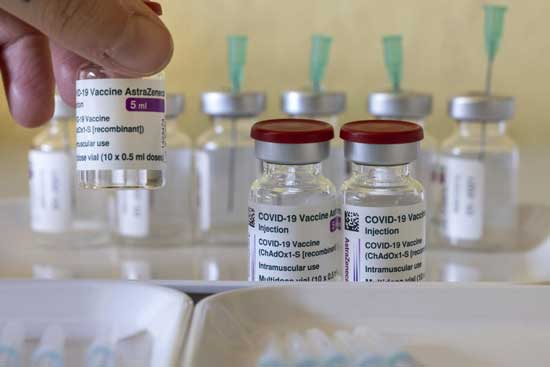- Turning Adversity Into Opportunity

“The Chinese use two brush strokes to write the word ‘crisis.’ One brush stroke stands for danger; the other for opportunity. In a crisis, be aware of the danger, but recognize the opportunity.” John F. Kennedy
As the world goes through the latest uptick in COVID-19 cases, one thing has become apparent. As cases drop, compliance with COVID-19 protocols falls and leads to clusters of infections. These clusters of infection are followed by community spread and a resultant rise in new cases, hospitalisation and mortality. This cycle is currently playing out in Brazil. Brazil is seeing the number of daily deaths exceeding 4000 in the last week. With scientists in Brazil claiming that new variants of SARS-CoV-2 are emerging weekly, these strains could find themselves around the world. Should that occur, there is the potential that some of these new variants could be resistant to the vaccines currently available and put the global vaccination program under threat. We believe that the longer countries are devoid of mass immunity, the higher the likelihood for this to occur.
Vaccination is the only way to achieve global mass immunity to SARS-CoV-2. However, vaccine availability constraints, as well as concerns about vaccine adverse effects implies significant rapid global vaccination. This situation has raised concerns in some African countries especially amongst those who have received their first vaccination dose. The major concern is the possibility of the second dose not being administered before the end of the 12-week window.
Most African countries that have commenced their vaccination program are relying on three approaches in their quest to obtain vaccines. The first approach is through the COVAX platform which heavily relies on vaccine production by the Serum Institute of India. The Indian government’s imposition of an export ban on COVID-19 vaccines has affected the COVAX platform. The ban is due to the current wave in India, which has seen daily new cases over 100,000 in the last week. We do not know when the ban will be lifted.
Only 7.11% (99.5 million) of Indians had received their first dose of vaccines. With an estimated population of 1.4 billion and the herd immunity threshold set at 75%, approximately 1.05 billion people, an endeavour that will require 2.10 billion vaccine doses. It seems to us therefore that unless the country has vaccinated enough people for the impact of vaccination to begin to manifest on daily new cases, the ban will have to stay in force. With optimal immunity following the first doses occurring after 21-days, likely, this evidence will not emerge for another 6 to 8 weeks. The extension of the temporary export ban on COVID-19 vaccine may further delay supply from COVAX to member countries. This is what makes the possibility of overshooting the 12-week window one of concern.
Countries, such as Nigeria, have changed their vaccination strategy so that those who have already received their first shot are guaranteed a second dose. Other countries, such as Ghana, have chosen to press on with their vaccination programs. Many will wonder which of the two approaches is prudent. This is a question we will proceed to address. Based on data available from the United Kingdom and Israel, the higher the percentage of the population that has received the first dose of a COVID-19 vaccine, the lower the number of new infections, hospitalisations and deaths are. This is because there is evidence that vaccines are preventing community transmission.
According to Public Health England (PHE), around 10,400 deaths were prevented from the start of the United Kingdom’s vaccination program in December 2020 to the end of March 2021. The breakdown is as follows, 9,100 in those aged 80 and over, 1,200 in those aged 70 to 79, and 100 in those aged 60 to 69. These results are a direct consequence of 56.63% of the population receiving the first dose of a COVID-19 vaccine. The U.K. will reach herd immunity by the 12th of April based on latest modelling. More deaths will be prevented based on the 92% drop in new cases since the peak of the second wave. The key thing is; all these outcomes are being driven with only 8.9% of the population having received both vaccine doses.
We believe it is better to vaccinate more people with a single dose whilst exploring other options for vaccine procurement, than it is to vaccinate fewer people with both doses. Readers must remember the emphasis of this vaccination drive is a community and not individual protection.
COVAX vaccine constraints have led the African Vaccine Acquisition Task Team to work with Johnson and Johnson (J&J). This is for 220 million doses of the J&J vaccine with the potential of a further 180 million doses. These vaccines are expected to be supplied over 18 months and will be produced by Aspen Pharma in South Africa. The advantage is that this is a single dose vaccine will cut down the logistics required to achieve herd immunity. However, the lengthy supply period may see Africa achieve herd immunity much later than initially estimated.
Another option being explored, but with less success, is bilateral agreements with Russia and China to obtain vaccine stocks. The country that has been most successful through this route is Morocco. Morocco has vaccinated approximately 25% of its population with vaccines procured from China. Other countries have struggled because they were late in commencing discussions making it difficult for their demands to be met. It is unlikely that this situation will correct itself anytime soon.
African countries may have to think of other strategies to ensure their economies can reopen. We suggest measuring antibody levels in people who have received one vaccine dose. Scientists can then ascertain the length of the immunity period conferred after one vaccine dose. This will help inform any decisions made should the 12-week time window of this vaccine be missed. Our political leaders need the willingness to back the scientists to turn this vaccine constraint adversity into an opportunity. Will we avail ourselves this opportunity? This is what makes the view expressed by John Kennedy poignant. We hope that we show leadership and do better.
Edited by Winifred Awa

















